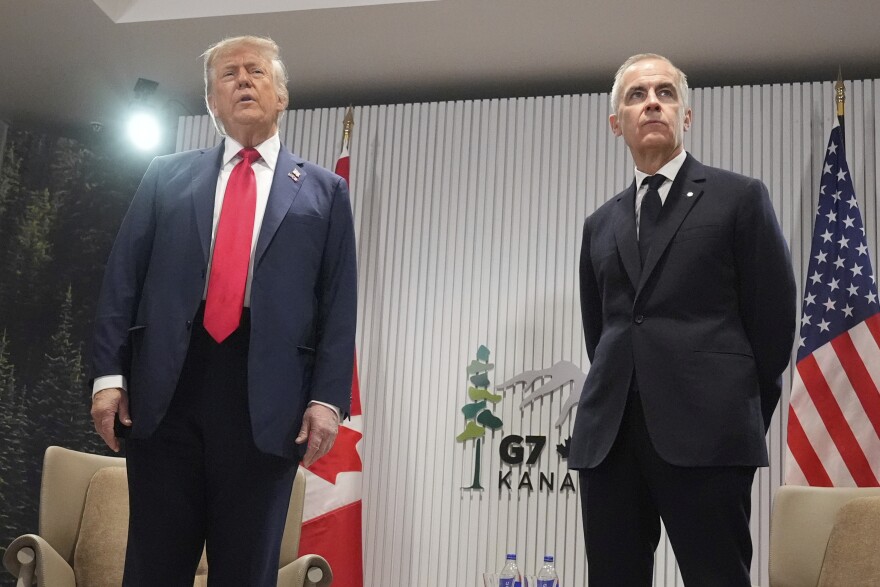Over the past several days, trade relations between Washington and Ottawa have gone from bad to worse. President Donald Trump has slapped an additional 10 percent tariff on Canadian products, coming a day after announcing he was calling off all trade negotiations with Canada.
It was a punishing move, supposedly made in anger over an anti-tariff television ad campaign sponsored by the government of Ontario.
When the ad first came to Trump’s attention last week, he said of it, “If I was Canada, I’d take that same ad also.” But it also angered him enough that he called off trade talks with Canada, throwing them into turmoil.
The anti-tariff ads featured clips of an address by former president Ronald Reagan, saying tariffs do not work. The $75 million ad campaign rolled out on all major U.S. networks.
Trump posted on his Truth Social account that the ad was a “fake,” and was not authorized by the Ronald Reagan Foundation. He also posted that tariffs are very important to the national security and economy of the U.S. and, based on their “egregious behavior,” all trade negotiations with Canada were hereby terminated.
Ontario premier Doug Ford agreed Friday to pull down the ad the following Monday, but earlier last week he defended the campaign.
“The message that we’re sending is really Ronald Reagan’s message that we’re sending out very clearly: protectionism does not work,” Ford said. “A tariff on Canada is a tax on Americans. That’s the message.”
But the ads continued to roll out over the weekend, especially during the World Series, where tens of millions of people across the U.S. saw them. An infuriated Trump then slapped an additional 10 percent tariff on Canadian products, saying the ads should have been pulled down immediately.
Ottawa appeared to be taken by surprise by Trump’s decision to end trade talks. Prime minister Mark Carney spoke to reporters as he was about to board an plane for Malaysia and the ASEAN summit.
“Look, for months we have stressed the importance of distinguishing things we can control and things we can’t control. We can’t control the trade policy of the United States,” Carney said.
The prime minister also stated that detailed negotiations with Washington had been ongoing over specific sectors, and Canada stands ready to pick up on the progress already made when the Americans are ready, because it will be to the benefit of both countries.
In Canada reaction is mixed over whether the ad campaign should even have been made.
“I think it was a high risk strategy. I didn’t predict that Trump was going to cancel the negotiations, but I don’t think it was a good decision to run those ads. I don’t think it was prudent,” said Ian Lee, an associate professor with Carleton University’s Sprott School of Business. “If the long game is not to punch Trump in the face, but the long game is to win a trade agreement, then I think that this was a mistake.”
Others have described it as ‘poking the bear.’
Many Canadian politicians, however, support the ad campaign. Prince Edward Island premier Rob Lantz says Ford has been a strong voice and effective at communicating the frustrations Canadians feel over the tariffs. Brampton, Ont. mayor Patrick Brown says “sometimes you need to throw a rock in a pond to get a splash.” And British Columbia is about to roll out its own anti-tariff ads.
“Speaking directly to U.S. citizens is important in this conversation. And if President Trump wants to stop conversations, stop trade talks, that is on him,” said British Columbia forests minister Ravi Parmar. “It’s easy for him to say it’s because of this ad, but reality is we’ve seen this on-and-off switch from the U.S. administration for almost nine months now and it’s disappointing. But we’re going to continue to push.”
Even in the U.S., some politicians like Democratic senator Tim Kaine of Virginia say Trump’s reaction to the ads was childish.
“I think this is a little temper tantrum that a toddler will have and it will blow over,” Kaine said. “But it’s embarrassing for the United States that we have a president who lets an ad rattle him so deeply.”
The next step is to get trade talks back on track. It’s still unclear whether Trump will follow through with his threats to end negotiations. Both he and Prime Minister Carney are in Malaysia for the ASEAN summit, then they head to South Korea for the APEC summit.


